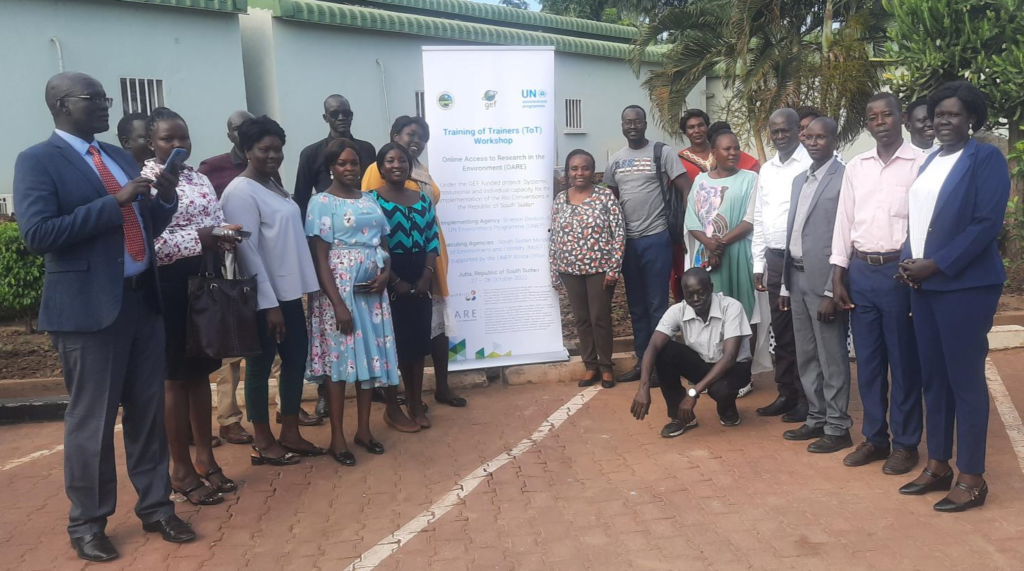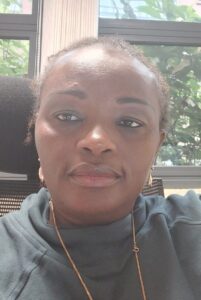From lawyer to librarian: meet OARE Program Manager at Research4Life
In this Q&A session, meet Angeline Djampou, Chief Librarian at United Nations Environment Program (UNEP) and the Program Manager for the Online Access to Research on the Environment (OARE) program, which is led by the UNEP as part of the Research4Life partnership.
Delve into Angeline’s insights as she shares how the power of information has profoundly influenced her academic and professional journey. Discover the transformative impact of Research4Life, not only as a source of quality information but as a catalyst for equipping individuals with essential skills. From her perspective on the program’s evolution to her hopes for its promising future, read this interview for a glimpse into the world of Research4Life and the dedicated individuals behind its mission.
What is your role in Research4Life, and can you provide details about the program you manage and its objectives? How does it work towards achieving its goals?
I am the program manager for the Online Access to Research on the Environment (OARE) which is led by the United Nations Environment Program (UNEP). OARE’s objective is similar to that of other sister programs within the Research4Life partnership: providing researchers, practitioners and policymakers in eligible countries free or low-cost access to scientifically sound environment content online.
What aspect of Research4Life resonates with you the most and fuels your passion for the program?
The power of information. I trained as a lawyer before I became a librarian. I believe one of the reasons I performed well in law school is not only having a well-resourced library, but also having librarians who knew how to point me to the best resources that responded to my information needs.
I have moved from a world of lack of information to that of information overload. The mantra is the same: Providing the right information at the right time. Not only does Research4life provide people with quality information, but it also equips them with the tools and skills to search, evaluate and select the right information at the right time in any given setting or context.
I enjoy teaching information seeking skills to empower people as much as possible. That allows me to return to the community the favour that was granted to me when I was in dire need of information.

Among the projects you’ve worked on, is there one that stands out as particularly satisfying or interesting for you?
I have never forgotten this anecdote that challenged as well as humbled me. I was conducting a Research4Life workshop in an eligible country. Usually, I speak of the concept of fair use (referring to the requirement of not printing or downloading more than 15% of a book or a journal issue), as if it is normal, and should make sense. Surprisingly it was one of the most time-consuming concepts! Many questions were asked around this concept which I attempted to address to the best of my knowledge, then this one:
“Madam, suppose we are a group of 7 researchers working on a project and we identify a book that would really help us. If we assign to each member the 15% to download (to make up 100% in total), will that be considered fair use?”
Don’t ask me what was my response, what would yours be?
Over time, how have you witnessed Research4Life evolve and transform?
With the support of all the involved stakeholders, the partnership has grown in many ways: i) increase of the content available to eligible countries, ii) expansion of the training topics to enable participation in scholarly communication, iii) increase in the reach of target audience in view of the variety of training delivery models (face-to-face, webinars, MOOCs, etc.). The latest addition of country connectors will help Research4Life to have greater impact in countries. With all the stakeholders working together to achieve a common goal, I see us moving from individual programs to a true partnership.
Are there any upcoming activities, projects, or initiatives you are eagerly looking forward to within Research4Life?
I have been working for years now to have Research4Life, through OARE, as one of UNEP’s services to countries. I am happy that it is an output under a UNEP project, and we are working to have it as a project on its one.
Outside of work, what are your interests and hobbies? Is there something unique or interesting about you that you’d like to share?
I am a lifelong learner. In my leisure time, I try to advance my knowledge in a variety of topics ranging from new advances in library science (for professional growth) to healthy cooking and eating. I have some wishful aspirations as well (such as gardening). How I wish there were 48 hours in a day.






